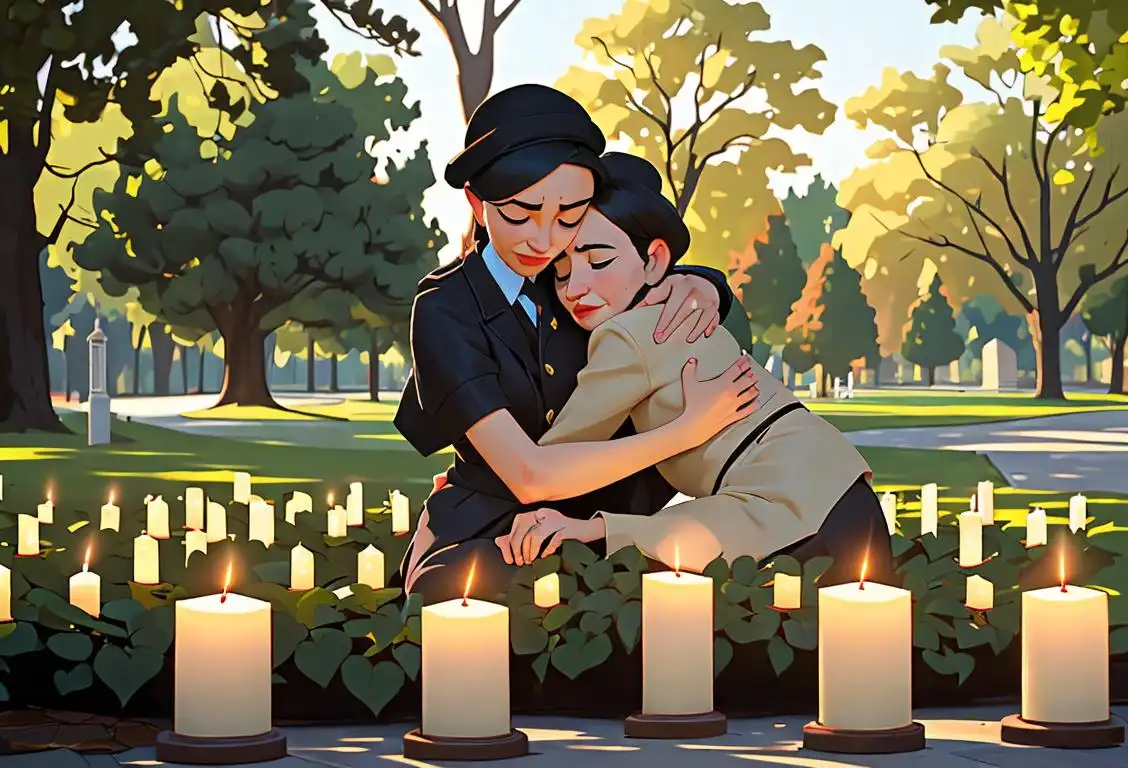National Holocaust Day

Welcome to WhatNationalDayIsIt.com, where we dive deep into the fascinating history of national days! Today we're shining a light on National Holocaust Day, a day of remembrance and reflection.
When is Holocaust Day?
It's national holocaust day on the 27th January.
The Meaning Behind National Holocaust Day
On this solemn day, we pay tribute to the millions of innocent lives lost during one of the darkest chapters in human history: the Holocaust. National Holocaust Day serves as a reminder of the atrocities committed during World War II and the importance of never forgetting.
This national day was established to honor the victims, survivors, and heroes of the Holocaust. It provides an opportunity for individuals and communities to come together, learn about the past, and work towards a future free from hatred and discrimination.
Remembering the Holocaust Online
In our increasingly connected world, the internet plays a crucial role in preserving the memory of the Holocaust. Online platforms allow survivors to share their stories, photographs, and documents, ensuring that future generations will continue to learn from the past.
Social media campaigns, dedicated websites, and educational resources contribute to raising awareness and promoting tolerance. Many organizations use the power of the internet to engage individuals worldwide in discussions about Holocaust remembrance, genocide prevention, and human rights.
While the internet has its fair share of trolls and misinformation, it also provides a platform for unity and education. We must utilize this incredible tool to combat ignorance and promote understanding.
Did You Know?
Did you know that the International Holocaust Remembrance Day was officially recognized by the United Nations General Assembly on January 27, 2005? This date corresponds with the anniversary of the liberation of Auschwitz-Birkenau, the largest Nazi concentration and extermination camp.
History behind the term 'Holocaust'
1942
Rise of the Term
The term 'holocaust' first gained significant attention during World War II, in 1942. The word, which has its origins in the Greek language, was used by the Nazis to describe their systematic destruction and genocide of the Jewish people. The Holocaust, also known as the Shoah, involved the mass murder of six million Jews, along with millions of other victims, including Romani people, Polish civilians, disabled individuals, political dissidents, and more.
1945
End of World War II
With the end of World War II in 1945, the horrific extent of the Holocaust became widely known. Survivors shared their harrowing experiences, providing eyewitness accounts and documents that revealed the atrocities committed by the Nazis. The term 'holocaust' began to be used more frequently in discussions about the genocide, as the world grappled with comprehending the magnitude of the tragedy.
1945
Nuremberg Trials
To hold the perpetrators accountable for their crimes, the Nuremberg Trials were conducted between 1945 and 1946. The trials, which took place in Nuremberg, Germany, prosecuted leading members of the Nazi regime. The evidence presented at these trials further exposed the horrors of the Holocaust, reinforcing the significance of the term 'holocaust' in describing the systematic extermination of millions of innocent lives.
1953
The Eichmann Trial
One of the most prominent individuals responsible for organizing the Holocaust was Adolf Eichmann, a high-ranking SS officer. In 1953, Eichmann was captured by Israeli agents and brought to trial in Jerusalem in 1961. The trial received international attention and brought the term 'holocaust' to the forefront of public discourse again, leading to a renewed focus on understanding and remembering the genocide.
1978
United Nations Holocaust Remembrance Day
In 1978, the United Nations established the International Day of Commemoration in Memory of the Victims of the Holocaust, observed annually on January 27th. This day aims to honor the memory of the Holocaust victims and prevent future acts of genocide. Through education and remembrance, the term 'holocaust' became firmly embedded in collective memory as a symbol of the unspeakable human tragedy endured during World War II.
2005
The Holocaust and Anti-Semitism
The term 'holocaust' expanded beyond its initial context to encompass other genocides and acts of mass violence throughout history. Additionally, the Holocaust's remembrance became a powerful tool in raising awareness about anti-Semitism and combating hate. By connecting the horrors of the Holocaust to contemporary issues, the term 'holocaust' serves as a reminder of the ongoing need to fight against discrimination, prejudice, and persecution.
Did you know?
Did you know that the International Holocaust Remembrance Day was officially recognized by the United Nations General Assembly on January 27, 2005? This date corresponds with the anniversary of the liberation of Auschwitz-Birkenau, the largest Nazi concentration and extermination camp.Tagged
awareness remembrance history human rightsFirst identified
28th April 2015Most mentioned on
27th January 2016Total mentions
768Other days
Holocaust Day
Slavery Day
Prisoners Of War Remembrance Day
Police Day
Parents Day
Holocaust Remembrance Day
Remembrance Day
Camera Day
Former Prisoner Of War Recognition Day
Siren Marking Holocaust Remembrance Day







